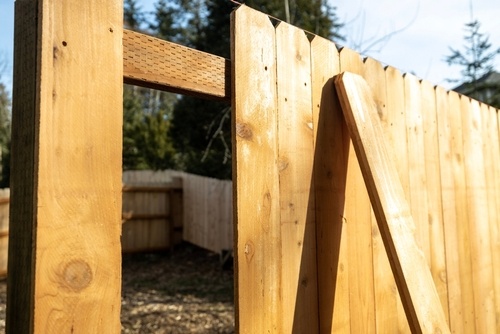
The opening pages of Bava Batra discuss how neighbours can force one another to build a fence between their properties. As we discussed in a prior post here, this rule is based on the principle of hezek reiyah, that viewing the private affairs of another is an actionable invasion of privacy. As such this law only applies in a residential area, where one has the right to privacy. Out in the field or in a valley one’s claim to privacy is denied, and those who want to build a fence must pay for it themselves – at least most of the time.
“One who surrounds his neighbour on three sides and builds a fence on the first, second and third side we do not require him to pay” (Bava Batra 4b). The issue the Mishna discusses is not privacy, but rather security. Fences – especially in ancient times - kept undesirables, of both the human and animal variety, out. However, unless such a fence completely surrounds one’s property, it does little good. The fact that Reuven’s fence surrounds Shimon on three sides is of little consequence and hence Shimon need not contribute to the cost of the fence.
“Rabbi Yossi says: If he fences in the fourth side we impose upon him all the costs.” This seems simple enough. By fencing in the fourth side, Shimon demonstrates that he prefers a protected property and has thus benefited from Reuven putting up the fences on the other sides. Hence Shimon can be forced to pay half the costs of all four fences.
However, if this is the view of Rav Yossi, what is the view of the Sages? If the Mishna quotes the opinion of a particular sage after an anonymous and consensus view, it is because there is something that the sage and the first view, that of Tanna Kamma, disagree about. Had Rav Yossi and the Sages agreed, there would be no reason to quote Rav Yossi independently.
While it may seem a bit startling, the Gemara begins its discussion by assuming that both the Tanna Kamma and Rav Yossi agree that it makes no difference who actually encloses the fourth side. Since Shimon is the beneficiary of a protected field he must pay, regardless if it was he or Reuven who built that fourth fence. The argument between the Tanna Kamma and Rav Yossi is one that often pits neighbour against neighbour, namely how expensive a fence it should be. What if Reuven uses the most expensive materials and fanciest design for his fence? According to the Tanna Kamma, Shimon can argue that he would have been happy with a basic fence and hence, should pay only for “the cheapest of reed fences”. On the other hand, Rav Yossi argues that Shimon must pay for half of the actual costs. “Could have, should have” matters little. He has a beautiful fence around his property and he must pay for it.
The Gemara offers another possible explanation for the point of their dispute: that it is not about paying for a fence, but paying for a guard to watch over the property. The Tanna Kamma argue that Shimon need only pay for a guard whereas Rav Yossi requires the outlay for a fence[1].
The idea that Shimon should have to pay because Reuven built a fence around his property did not sit well with all. Why should he have to pay for something he never asked for? And so according to a third explanation of their dispute the Gemara posits that the Tanna Kamma require only that Shimon pay for half the cost of the fourth fence. While Shimon may not have requested a fence, he did not protest it either, and having an enclosed and protected field is a benefit he must pay for. Rav Yossi goes a step further and argues that even when Reuven puts up the fourth fence, Shimon must pay his share of all four fences.
The Gemara presents a fourth possible explanation of the debate: as in the prior explanation all agree that if Shimon builds the fourth fence, he must pay for half the costs. But if Reuven builds the fourth fence, the Tanna Kamma would require Shimon to pay for half of all four fences, whereas Rav Yossi argues that if Reuven builds it, that is his problem, and he cannot force Shimon to pay anything.
Interestingly, according to all four ways to understand the debate, either Rav Yossi or the Tanna Kamma or even both argue that Shimon can be compelled to pay for half the costs of a fence he never requested and may have never built himself. And this view is indeed accepted in Jewish law. Who built the fence is much less relevant than the fact that the fence was built. Furthermore , the Rambam adds that this applies only if the wall is partially built on Shimon’s property allowing him use of the wall itself.
The commentaries (see Maggid Mishna, Hilchot Shechenim 3:3) further note a most important caveat: namely, that if Shimon protests that he has no interest in a fence he cannot be compelled to pay for one. If not there would be little to prevent someone living in an area where fences are not the norm from getting someone to pay for half the costs of his fence[2].
How wonderful it would be if neighbours could agree if, when and how to build a fence. But such is often not the case, and our Sages spend great efforts setting the parameters of neighbourly relations so that minor skirmishes do not turn into generational feuds.
[1] While it seems obvious to us that a fence would be cheaper than a guard the Talmud assumes hiring a guard when needed would be more cost effective something that I must admit I can’t quite understand.
[2] We have been assuming in this entire discussion that we are dealing with a case where Jewish law does not require a wall be built between Reuven and Shimon. And this is indeed how most understand our Mishna. However there is a view that the discussion is a case where one neighbour can demand a fence be built. Such an approach makes it abundantly clear why Shimon can be made to pay for the entire fence. What would need clarification is the view that Shimon not pay for half the costs.



